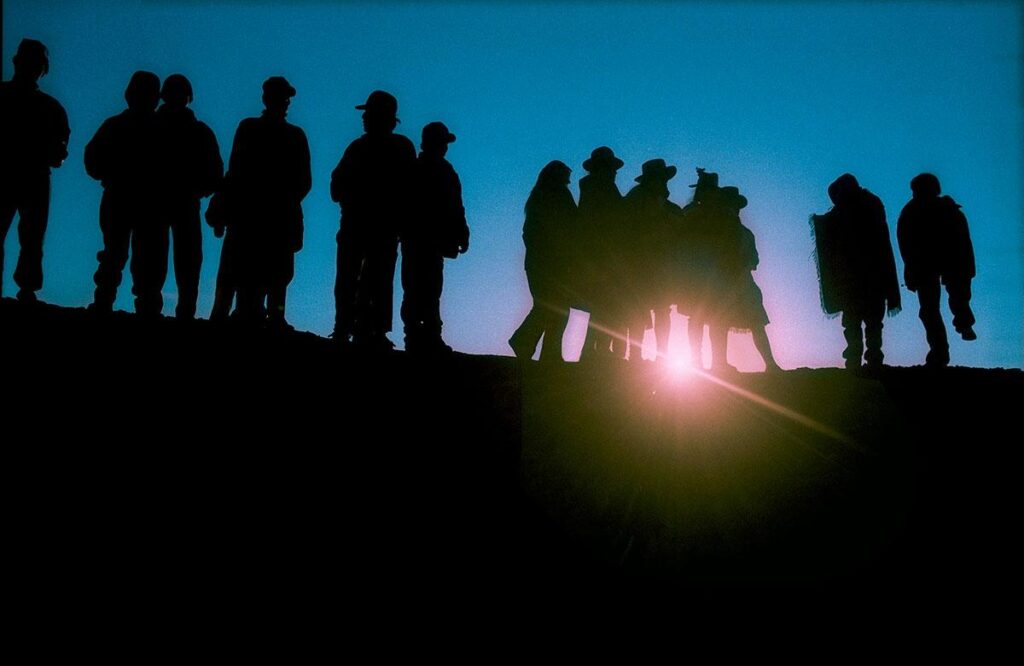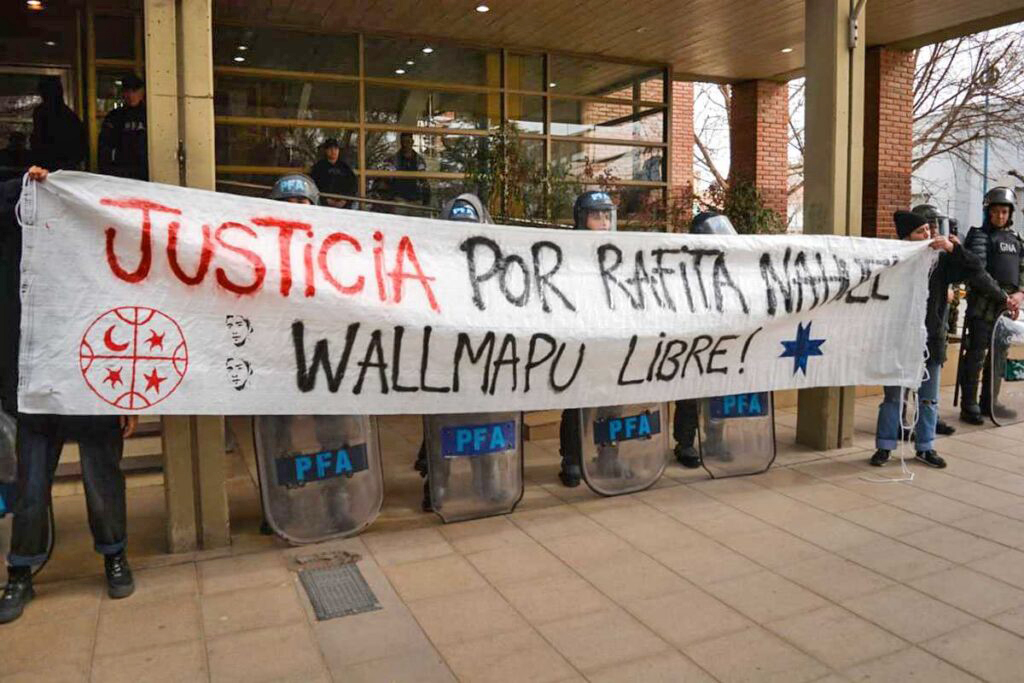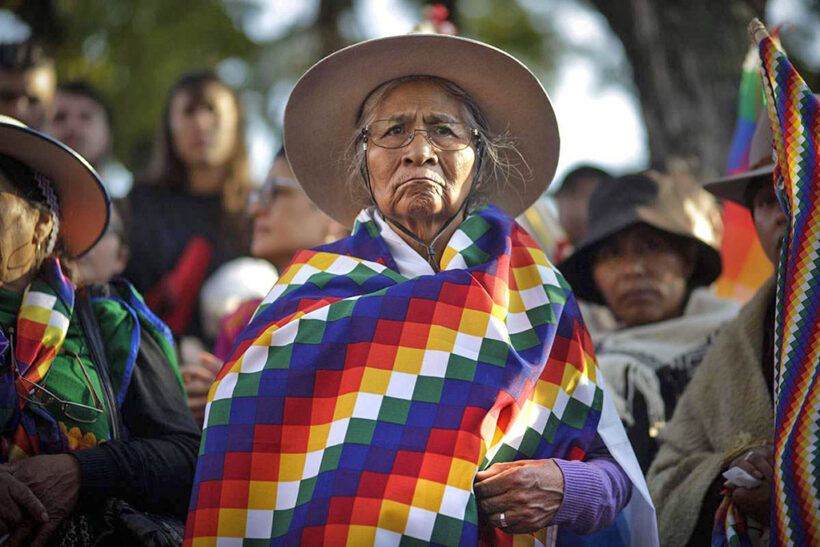In times of elections, advances of right-wing options and democracies in crisis, indigenous peoples propose other models of life: without exploiting nature, with solidarity, complementarity and reciprocity. Overcoming genocide, structural racism, extractive governments and millenarian peoples who mark out paths.
“We Argentines arrived from the boats”, said Alberto Fernández in June 2021. “In South America we are all descendants of Europeans”, defined Mauricio Macri in January 2018. “We are children, grandchildren and great-grandchildren of immigrants. This is Argentina”, asserted Cristina Fernández de Kirchner in April 2015. The last three presidents of Argentina have insisted on the nonsense that runs through the vision of an important sector of society: that the country was made only by immigrants from Europe. And they deny that Argentina was founded on a genocide of indigenous peoples, which included concentration camps, baby stealing, kidnapping, disappearances, torture and mass murder.
What’s more, there was no “never again” for these crimes. Perhaps this explains why, even 140 years after the start of the (misnamed) Conquest of the Desert, the fate of the indigenous peoples is still a matter of the structural racism they suffer, the repression carried out by the state apparatus and territorial dispossession, a central element of the economic policies and quasi-war booty of all the governments in power.
It is no coincidence: successive presidents have based their economic model on exploiting raw materials, as in the times of the “breadbasket of the world” at the end of the 19th century. Mega-mining, agribusiness, oil, monoculture forestry – among others – are the central activities for obtaining foreign currency for the state coffers.
All these activities require territories of sacrifice. This is precisely where indigenous peoples have lived for generations. Although there is a wealth of legislation that should curb extractivism (and protect indigenous communities), the judiciary looks the other way.
“For this system, to be indigenous today is to be subversive”, explained Jeremías Chauque, Mapuche, musician, producer of healthy food, from his ruka in Desvío Arijón. Why? Because indigenous peoples question extractivism not only discursively, but also with their bodies: “We will never accept extractivism. And we are going to die fighting against mining, oil and genetically modified companies. That is why we are considered a danger”. And, at the same time, they question the system, capitalism, where the exploitation of raw materials is a central cog in the wheel.
The Diaguita Javier Chocobar (Tucumán), the Qom grandfather Roberto López (Formosa) and the Mapuche Rafael Nahuel (Río Negro) are just some of the fatalities of recent years. Cristina Lincopan (a young Mapuche girl who died in Neuquén due to oil pollution) and Néstor Femenía, a Wichí child who died in Chaco due to malnutrition and lack of basic medical care, are also among them.
It is impossible to summarise the serious situations and struggles of Argentina’s indigenous peoples. The last systematisation of territorial conflicts (2019) established a floor of 183 cases, where indigenous communities defend their territories against mining, farming, oil and real estate companies, among others. Also, of course, against the state (municipal, provincial and national).
 Photo: Nicolas Pousthomis/El Tierra Viva Agency
Photo: Nicolas Pousthomis/El Tierra Viva Agency
Two facts stand out in times of a new October 12 and presidential elections:
-The trial for the murder of 22-year-old Rafael Nahuel, who was shot in the back by agents of the Prefecture commanded by Patricia Bullrich in November 2017. Six years after the event, and with the prefects at liberty, last week Judge Alejandro Silva (Federal Oral Court of General Roca) heard Mapuche voices: members of Lof Lafken Winkul Mapu, families and friends of Rafael Nahuel. A symptom: the hearings go almost unnoticed by the mainstream media, by the national government and also by human rights organisations (with some exceptions).
-The Third Malón de la Paz, which left Jujuy and arrived in the city of Buenos Aires on 1 August, maintains its vigil in front of the Supreme Court of Justice. They demand the repeal of the constitutional reform of Jujuy (imposed in record time, with repression and against the backdrop of lithium mining). They were not received by the judges of the highest court or by the majority blocs in the National Congress.
Extractive Democracies, Selective Human Rights and Indigenous Peoples
The repressive situation in Jujuy, in order to impose constitutional reform, merited denunciations and voices of solidarity from the ruling Peronist party. Gerardo Morales, radical and vice-presidential pre-candidate for the Juntos por el Cambio (Together for Change) alliance, stood opposite. The Peronists and their allies sketched out a theory: Jujuy would be the test balloon for a possible next government under this political sign. Socio-environmental assemblies responded that the repressive state to impose extractivism has been a fact for some time. Even in San Juan and Catamarca, the “mining dictatorship” is being denounced, in total complicity of the governments and judges/prosecutors with the extractive companies.
After the PASO elections, and after the electoral coup of Javier Milei’s ultra-right wing against Unión por la Patria and Juntos por el Cambio, the candidate Sergio Massa called (in a public act in Salta) for “a government of unity”, where he even praised the governor, Gerardo Morales.
Amnesty International, an organisation that cannot be labelled pro-government, made a special visit to Jujuy, interviewed more than a hundred people and confirmed the systematic violation of rights: “The Jujuy police responded with indiscriminate force against those protesting for their rights. Our investigation points to how the provincial authorities have created a hostile environment for the people of Jujuy to exercise their right to non-violent protest.
As in Jujuy, and in a context of climate crisis – with extreme temperatures and heat waves that shake the planet – Argentina’s majority parties insist on the same recipe as 200 years ago: export raw materials, exploit nature, include territories in the extractive economy.
Javier Milei directly denies climate change and a few weeks ago stated that “a company can pollute a river as much as it wants”. He stated that the value of water is “zero” and proposed the appropriation of this asset by companies.
Sergio Massa, in one of his latest spots, will be proposing: “We have lithium, gas and oil. We have fields”. And, as a fait accompli, his small payment (Tigre) is a paradise for large real estate companies that destroy wetlands.
For her part, Patricia Bullrich was against the nationalisation of lithium but in favour of exploiting it. Regarding mega-mining, she said on Twitter: “It will be one of the levers of the great productive impulse we need to get out of backwardness and poverty”. It is important to remember his actions in the disappearance followed by death of Santiago Maldonado and the murder of Rafael Nahuel.
Myriam Bregman (FIT-U) is the only one who clearly questions extractivism.
 Photo: Jaime Carriqueo
Photo: Jaime Carriqueo
Mauro Millán, lonko of Lof Pillan Mahuiza (Corcovado, Chubut), explains that the current context is one of “the apogee of extractivist capitalism”, where the Mapuche people are rowing against the current. “What do we want? The state only thinks in terms of conflict. We make it clear that there has to be a political dialogue, because it is not just a perimeter conflict, they have to understand that it is much more than that. They have to accept some kind of space to discuss differences, to look for real solutions, but this will never be achieved through repression, persecution, denial, imprisonment and death, as the governments have acted up to now”.
He recalled that this is a millenary people that many believed had almost disappeared, a people that suffered state violence long before the dictatorships. “And, despite everything, it is a people that maintains its vitality, demands rights, projects its society”, he says.
Marcos Pastrana, a Diaguita grandfather from Tucumán, makes the historical reading and links it to the present: “During colonial times there was a distribution of regions and wealth. Today’s capitalism reconfigures the map of America once again, there is a new distribution based on economic interests, the multinationals legislate for our legislators, and they serve the interests of these companies without any compunction”.
With 500 years of violence and extractivism, Pastrana affirms that real change will not come about through elections, but through “a change in natural consciousness”, a knowledge of the original peoples that implies an “awakening” based on three concepts: solidarity, complementarity and reciprocity. And, above all, with a link that those in power do not want to understand: “The earth is our mother and we belong to her. No one can uproot us from our Pacha. Our culture, our cosmovision, is the only containment fence we have to resist”.






